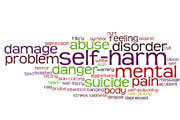Suicide is not something the public talks about openly and honestly. There is taboo associated to suicide, and people have a hard time acknowledging the death as a suicide. It’s not a word we expect to encounter in the obituaries. Why is this, and what are we going to do to change it?
Who Commits Suicide?
We might assume that everyone who commits suicide has a mental illness, however this is not true. Sometimes people have situational problems in life, which drive them over the edge. While a lot of suicide is linked to mental heath, there are other reasons why people choose to not be here anymore. Though it’s safe to say, most suicides are a mistake. Like they say, “suicide is a permeate solution to a temporary problem” or “all suicide does is transfer your pain onto someone else.” Whatever we’re feeling in the moment is not what we’re destine to feel forever. Every day is a new day, and things change all of the time. You can grow tired of being in pain, but you have to ask yourself, have you really tried everything? There is always hope, even when you feel hopeless.
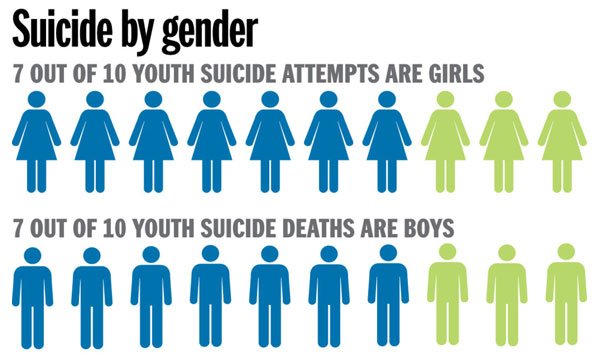 Suicide is a private issue that needs to be made public.
Suicide is a private issue that needs to be made public.
A Cry for Help
A lot of the time suicide is a cry for help, and even with mental health that person might be battling with emotion mind or reacting off of impulse. Emotion mind is when you let your emotions take over your rationality, and you don’t think in wise mind. How you feel suddenly takes over everything else and it can drive you towards unhealthy behavior. It can drive you over the edge. It is often reported that people with mental illness “accidently” kill themselves when they are in an episode or feeling the weight of an impulse.
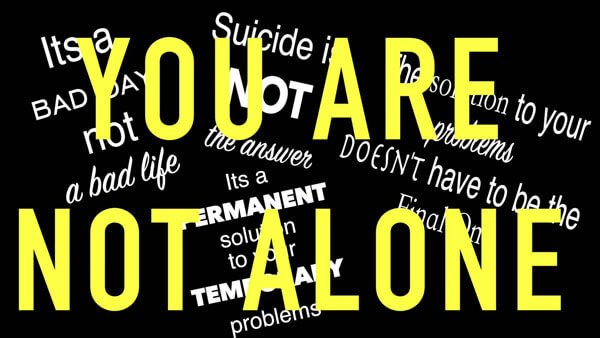 Always reach out for help no matter what.
Always reach out for help no matter what.
What Can We Do?
It is important that you realize that what suicidal people need is someone to talk to. If someone tells you they want to kill themselves don’t tell them they need to see a counselor or physiatrist, they called you for a reason. Active listening and empathy are key. Try to be there as much as you can. Attempt to deescalate the person through listening, which means you bring down their emotional level. Don’t end the call without a “no harm agreement”, which means the person is promising not to harm themselves, but also that if urges to do anything harmful come up that they will call you back. Give them the number of your local crisis or suicide line just in case you are unable to answer the call. It is important that you properly assess the suicide and get an agreement from the person that they will seek help if suicidal feeling overcome them again.
 Confide in people who don't judge you and accept you for who you are.
Confide in people who don't judge you and accept you for who you are.
How Do We Assess Suicide?
There are four P’s to suicide prevention: pain, previous history, plan and pluses. Pain is how high are the emotions, or in other words how serious is it? What are they saying? What’s the plan? With suicide there are lethal means, which statistically men are more prone to. If your person is in lethal means territory, you have to assess this as a part of their plan. You have to ask yourself, how serious is this suicide plan? Is the person in a place of danger or close by to her means of suicide? “How about we just talk for a second and you leave the knife in the other room?” Or, “How about we step away from the bridge while we talk.” If the means are in the room, you want to encourage them to leave the room. If the person’s plan is very well executed, you likely want to call 911. It all depends on their level of pain and plan.
Previous history is knowing if the person has ever tried to commit suicide in the past. If the answer is yes, the person is more than likely to try again.
Pluses are the person’s reasons to live. The fact that they called you in the first place is a huge plus so count that as one. Ask the person what their reasons to stay might be, and highlight those pluses throughout the call.
Consider pain, plan, previous history and pluses during the call and assess what precautions you should make.
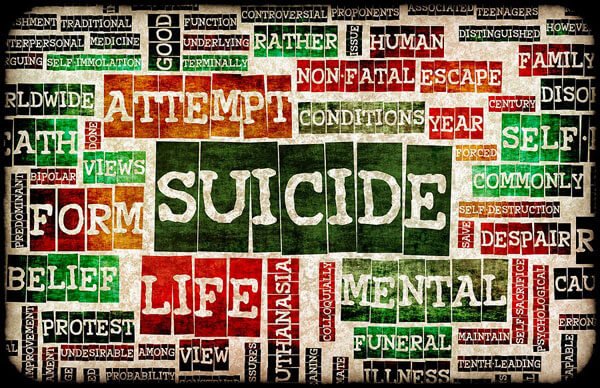 Suicidal thoughts can affect anyone.
Suicidal thoughts can affect anyone.
Don’t Be Afraid of the word Suicide
You might make the naive assumption that everyone enjoys life and wants to be here, but that is simply not the case. For some people life is a constant struggle, they face negative feelings at times of celebration, they can't focus or do their work, and they don't have any real control over it. They do things that don't correspond to their character, and people don't show forgiveness. People are so quick to judge.
Everyone is scared off by people feeling this way when they have to learn how to help and support them. If a person is in immediate danger, like stated earlier, by all means, call 9-1-1, but if a person is thinking about suicide, doesn't have a plan and just needs to talk--you shouldn't turn them away. You know them better than a stranger, and you can help reassure them based off of knowing them. If that person has reached out, that in itself is a huge plus that they want to live. The fact that they called and didn't just proceed with their plan is huge. Get them to evaluate the pluses in their life (reasons to life) and assess the four P's of suicide: pain, previous history, plan, and pluses.
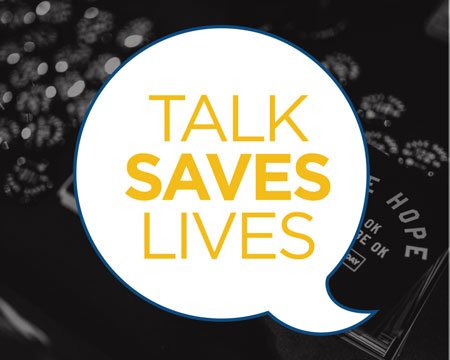 Sometimes you just need someone to listen to you.
Sometimes you just need someone to listen to you.
People who say they want to end their life shouldn't be dismissed. I know of a girl who told two "friends" about her suicidal thoughts and they blocked her on Facebook. She then OD'd. You should never take it lightly, even if you don't really care about that person, remember that other people do. That's somebody's daughter or son, and that is a life, whether it is valuable to you or not, it is somebody's life, and just think of the courtesy you would like to be bestowed upon yourself.
Emotions are scary, yes, but you can't avoid them. They are a part of life, and some people have deregulated emotions, which are caused by chemical imbalances in the brain. It is 100% medical so why do we run away from it, when we would never do that if someone had Diabetics or Cancer?
It is sad to know that we live in a world where people will so coldly and ignorantly turn their backs on someone in need. If you really can't deal with it, contact one of their closer friends, but don't do nothing. There is so much shame in that, and people have to be more accepting of those who do get negative sometimes. Sometimes these people are sick and battling day-to-day. They are doing the best that they can and they honestly do not mean to impact or hurt anyone. That's merely the reality they are experiencing, and just because it is different than yours, you shouldn't shun it.
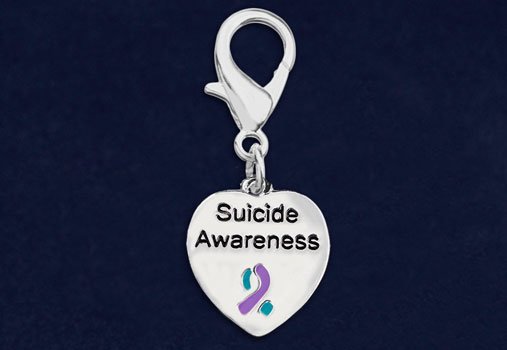 September is the month of suicide awareness week!
September is the month of suicide awareness week!
Yes, people will mental health issues can go on medication, as many do, but the medicine doesn't cure the illness, it simply helps to better manage it. Having knowledge about these things will help you make better decisions about people before you judge them, exclude them, call them names or cast them off--consider that they might be experiencing something really traumatic and life-threatening and that they probably are not even aware of how they are disturbing you--they don't always have self-awareness or impulse control. Lead with empathy and love, because there is so much hate in this world that people feel they need to take their own lives, and perhaps if we showed just a little more compassion towards others we would be able to minimize this issue, even if it's just a little bit, every shred of progress counts.
How Do We Stop the Suicide Stigma?
Acknowledge what has been said in this article. Remember, it is very important that we talk openly about our feelings and use the real words to identify our behavior. Suicide is a private issue that needs to be made public. We need to use the right language so that society can see how big of a problem this is. We also have to rise up and be there for someone in this state. Remember, if you don't think you are able to help, tell someone who can.
This Monday, September 10th is World Suicide Prevention Day, which always falls during Suicide Prevention Week which runs from September 9th - 15th, 2018. Use this time to open up about feelings and talk about your convictions on suicide and how we can prevent it. Advocate for this very important cause and let people know that help is available, and that it isn't hopeless.
 Asking for help makes you brave not weak.
Asking for help makes you brave not weak.
If you are feeling suicidal, we urge you to reach out and talk to somebody that you trust. Call a crisis line, talk to your parents, a close friend, a school counselor or a teacher. Talk to someone who you feel comfortable with. Write in to Dear Dish-It. Do whatever you can to feel supported, and if you try to open up to someone but it doesn’t go well, don’t give up. There are people who really care about you, remember that always and hang in there. “I don’t think anyone really understands how tiring it is to act okay and always be strong when in reality you’re close to the edge.” Asking for help does not make you weak, it makes you brave. Fight for your life, you deserve to overcome the battle. No one should suffer in silence and this includes you.
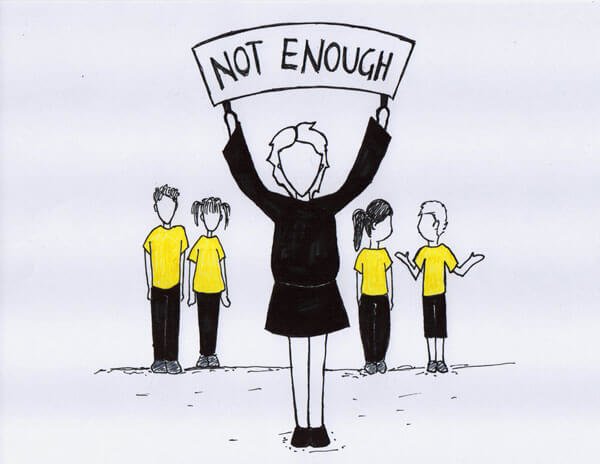 Sometimes our level of support for others is not enough.
Sometimes our level of support for others is not enough.
Helplines & Resources:
- TeenMentalHealth.org
- KidsHealth - A safe, private place for kids & teens who need honest, accurate information and advice about health, emotions, and life.
- Teen Line - A helpline for kids and teens to work through their personal issues and mental health as needed. 1-800-TLC-TEEN or 1-800-852-8336 (Toll-Free US & Canada).
- Mind Infoline – Information on self-harm and a helpline to call in the UK at 0300 123 3393 or text 86463.
- Kids Help Phone – Free, anonymous and bilingual helpline for young people in Canada, available 24/7 by phone, Live Chat, and the Always There chat app for any issue, including self-injury and suicide. Call 1-800-668-6868 or visit kidshelpphone.ca.
- Kids Helpline – A helpline for kids and young adults in Australia to get help with issues including cutting and self-harm. Call 1800 55 1800. (Kids Helpline).
Give Us Your Opinion
Have you ever felt suicidal before? How did you get past it? Comment below.






























